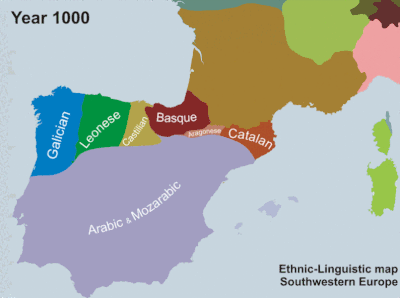Basque language: Difference between revisions
Jump to navigation
Jump to search

George Swan (talk | contribs) (more details) |
m (caps) |
||
| Line 1: | Line 1: | ||
{{subpages}} | {{subpages}} | ||
[[File:Linguistic map Southwestern Europe-en.gif | thumb | 400px | This animated map shows a gradual shrinkage in the area where the basque language is spoken.]] | [[File:Linguistic map Southwestern Europe-en.gif | thumb | 400px | This animated map shows a gradual shrinkage in the area where the basque language is spoken.]] | ||
The ''' | The '''Basque language''', known to speakers as '''Euskara''', is one of the few non-[[Indo-European languages]] to survive in [[Europe]] to the present day.<ref name=Bbc2015-09-07/><ref name=bbc2017-07-19/> There are no languages related to the Basque language. | ||
The ''[[BBC News]]'' reported, in 2017, that 700,000 people speak the basque language. | The ''[[BBC News]]'' reported, in 2017, that 700,000 people speak the basque language. | ||
Revision as of 03:32, 22 August 2022
The Basque language, known to speakers as Euskara, is one of the few non-Indo-European languages to survive in Europe to the present day.[1][2] There are no languages related to the Basque language.
The BBC News reported, in 2017, that 700,000 people speak the basque language.
References
- ↑ Ancient DNA cracks puzzle of Basque origins, BBC News, 2015-09-07. Retrieved on 2022-08-20. mirror
- ↑ The mysterious origins of Europe’s oldest language, BBC News, 2017-07-19. Retrieved on 2022-08-20. “Euskara, spoken in the autonomous communities of Navarre in northern Spain and the Basque Country across northern Spain and south-western France, is a mystery: it has no known origin or relation to any other language, an anomaly that has stumped linguistic experts for ages.”
